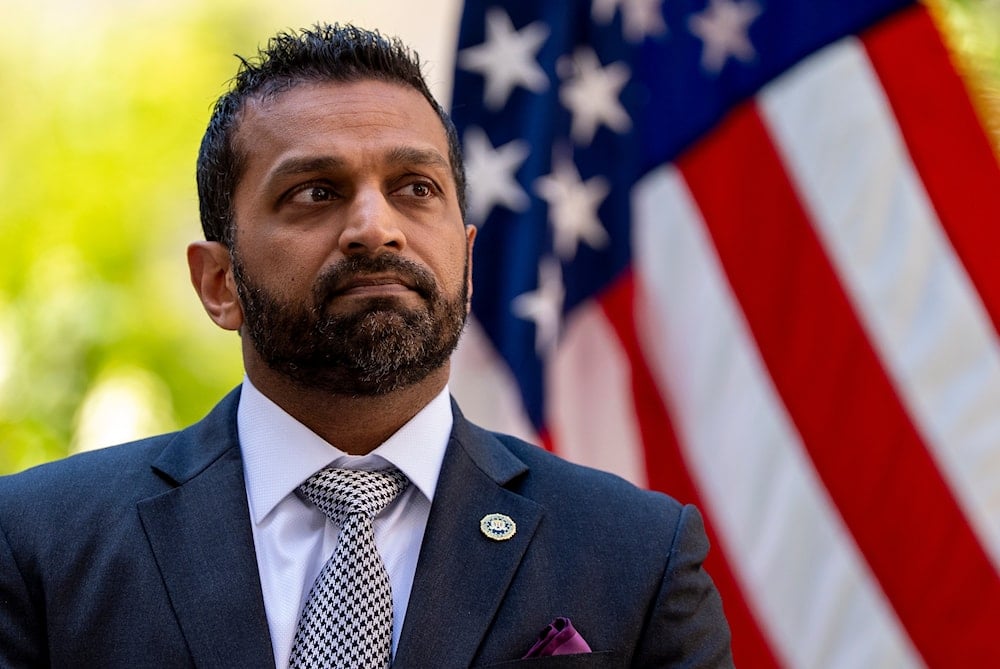FBI uses polygraphs to check officials’ loyalty, stirs internal uproar
The FBI's use of polygraph tests under Patel and Bongino raises concern over political loyalty demands and internal pressure on dissenting agents.
-

FBI Director Kash Patel listens during a news conference at the Department of Justice, Wednesday, May 7, 2025, in Washington. (AP)
The FBI has traditionally used polygraph tests to uncover untrustworthy employees; however, under Trump's FBI Director Kash Patel, the bureau has increased these tests, even asking agents if they've criticized him, The New York Times reported on Friday.
During interviews and polygraph tests, the FBI has questioned senior employees about whether they have made disparaging remarks regarding Kash Patel, as reported by two individuals aware of the inquiries and others familiar with such instances.
In one case, officials were required to undergo polygraph testing as the FBI attempted to identify the individual who leaked information to the media about Patel’s request for a service weapon, an atypical demand since he does not serve as a field agent.
According to multiple sources familiar with the situation, dozens of officials have been required to take polygraph tests, though the exact number questioned specifically about Patel remains unclear.
Politically motivated, highly inappropriate
The FBI's expanded use of polygraph tests, along with the pointed nature of the questioning, forms part of the bureau's larger campaign against media leaks and highlights Patel's strong concern about his public perception.
Former bureau officials characterize these actions as politically motivated and deeply improper, arguing they reveal a troubling demand for loyalty within the FBI that leaves little room for disagreement or opposing views. Former officials warn that criticizing Patel or his deputy, Dan Bongino, may result in termination.
James Davidson, a former FBI agent with 23 years of service, told the NYT that "an FBI employee’s loyalty is to the Constitution, not to the director or deputy director," adding that "it says everything about Patel’s weak constitution that this is even on his radar."
Rubbing conservatives the wrong way grounds for termination
Trump's political appointees have intensified their control over the FBI by removing employees or placing them on administrative leave, driven by objections to past investigations that angered conservatives and by claims that the bureau had become politicized. This long list included some of the most respected officials in the bureau at its highest levels.
Additional personnel have departed due to concerns that Patel or Bongino might punish them for carrying out proper investigations that drew disapproval from Trump or his allies, with senior agents in approximately 40% of field offices having either retired, been removed, or reassigned to other positions, according to sources familiar with the situation and an analysis by The New York Times.
Tonya Ugoretz, a senior intelligence official, was placed on leave after it emerged she helped retract an unverified FBI report claiming China sought to sway the 2020 election for Joe Biden, based on secondhand info from a new Albany informant.
During her tenure as a senior cyberdivision official, Ugoretz flagged the intelligence report before the 2020 election due to its significant flaws, as shown in emails provided to Congress, while another colleague who reviewed the document left the FBI soon after Patel became director.
Fawning Patel helps secure promotions
The ongoing shakeup has rapidly elevated certain individuals into key positions. Will Rivers, who previously served as assistant director overseeing the security division, quickly rose to become the FBI's third-highest ranking official in March, while cultivating favor with Patel and Bongino by implementing their personnel policies
Jake Hemme has quickly climbed to become Patel’s deputy chief of staff for policy, a notable promotion for someone who, as his LinkedIn profile shows, only joined as an agent in July 2022.
Patel, Bongino deploy polygraphs aggressively
While courts generally reject polygraph results as inadmissible evidence, national security agencies continue to routinely employ these tests during investigations, security clearance evaluations, and other internal processes.
During Patel and Bongino's leadership, the FBI implemented polygraph testing with unprecedented intensity, with many employees ordered to undergo examinations, witnessing colleagues dismissed during the administration's initial personnel overhaul, while others subsequently faced removal or downgraded positions.
According to a source with knowledge of the situation, the FBI placed an agent on administrative leave before recalling them specifically to undergo polygraph testing in at least one documented case.
Until his departure in spring, Michael Feinberg, a senior agent in the FBI's Norfolk field office, faced threats of polygraph testing due to his association with Peter Strzok, the former counterintelligence official dismissed for sending anti-Trump text messages.
To keep his job, Feinberg added that he was “expected to grovel, beg forgiveness and pledge loyalty as part of the FBI’s cultural revolution brought about by Patel and Bongino’s accession to the highest echelons of American law enforcement and intelligence.” The agent resigned before he could take a polygraph.

 5 Min Read
5 Min Read








